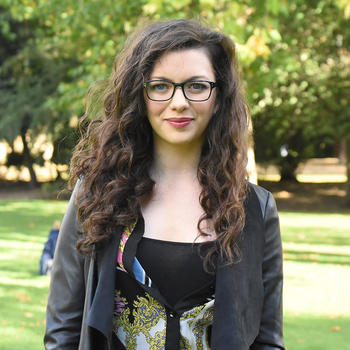Sinéad Murphy (King's College London)
Early Career Fellow in Research Area 3: "Future Perfect"
July–December 2020
Restless Forms of Present Futures: Metropolitan Imaginaries in Arab Speculative Fiction
Sinéad Murphy researches how science fiction has, for Arab writers, been a privileged genre to negotiate their global positionality and imagine the 'world'. Focussing on contemporary Arab-authored science and speculative fiction in English translation, her research brings world-literary notions of combined and uneven conditions of production to bear on the organising principles and cultural capital of science fictional texts. This work analyses speculation as a critical practice which both registers and co-constitutes temporal and spatial transformation in contemporary Arab creative works. Symbolic and material inequalities of the literary world-system are, she proposes, encoded in the presentation and marketing of this material in English translation, and the language of science fictionality – the strange, the unfamiliar – can sometimes serve as a gloss for orientalising forms of framing and reception.
Sinéad Murphy's postdoctoral research examines the often meta-fictional ways in which works of Arab speculative fiction engage with the idea of the global. Rapid economic-spatial transformations taking place in Gulf countries, for example, are often articulated in speculative and futuristic terms, while the production of necropolitical space in Palestine and Iraq is often described using a science fictional lexicon. This research builds on Sinéad Murphy's doctoral thesis, in which she argued that an analysis of Arab-authored speculative fiction could productively inform critiques of some of the narrow categories into which political developments in the Middle East and North Africa have been aggregated, following large-scale political and economic transformations throughout the region from the 1970s onwards.
Sinéad Murphy has recently worked as a Lecturer in English and Comparative Literature at King's College London, having completed her AHRC London Arts and Humanities Partnership-funded PhD in Comparative Literature in 2019. She also works at the Middle East Centre in the London School of Economics. She is an assistant editor at Fantastika Journal, and a member of the interdisciplinary UK-based research collective Beyond Gender. Her work has been published in Science Fiction Studies, Strange Horizons, The Literary Encyclopedia,and the Postcolonial Studies Association Newsletter. Her primary areas of research are modern and contemporary Middle Eastern literature, speculative fiction, theories of world literature, and postcolonial theory.
